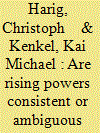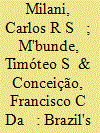|
|
|
Sort Order |
|
|
|
Items / Page
|
|
|
|
|
|
|
| Srl | Item |
| 1 |
ID:
153860


|
|
|
|
|
| Summary/Abstract |
This article illustrates how Brazil responded to the policy challenges its foreign policy activism posed for its engagement with a fundamental question of the international order: the tension between the protection of human rights and the prohibitions on intervention and the use of force. Leading the military component of the UN Stabilization Mission in Haiti (MINUSTAH) implicated accepting the mission's robust mandate that contradicted Brazil's traditional foreign policy positions. Notwithstanding this apparent contradiction, the country's diplomats also tried to shape UN debates on intervention norms, resulting inter alia in the ‘responsibility while protecting’ initiative. By analysing diplomatic efforts and military actions on the ground, we argue that since the watershed moment of becoming the most influential troop contributor to MINUSTAH, interests and actions of the armed forces increasingly contradict the efforts of Brazil's diplomatic establishment. The influence of Brazil's diplomacy in shaping intervention norms has proved to be rather elusive, compared with its military's palpable role in developing robust approaches for peacekeeping mandates revolving around the protection of civilians. Yet we argue that this apparent contradiction should not be seen as inconsistency. Instead, the case of Brazil shows typical signs of the ‘graduation dilemma’, in which both diplomats and military behaved in an eminently rational fashion.
|
|
|
|
|
|
|
|
|
|
|
|
|
|
|
|
| 2 |
ID:
153858


|
|
|
|
|
| Summary/Abstract |
The main argument of this article is that second-tier, non-nuclear powers face a ‘graduation dilemma’ whenever their key decision-makers have the opportunity and the objective to choose between different international strategies: between a more autonomist type of development or a more dependent one; in security terms, between bandwagoning and balancing; when building a multilateral policy, between traditional alliances and innovative, flexible coalitions; in geopolitical terms and in the field of development cooperation, whether to emphasize North–South or South–South relations. These ideal binaries offer several other options which decision-makers may envision and implement. The concept of graduation dilemma that we propose has three main components that key decision-makers need to face: (a) the scope of their international ambition, the country's material capabilities and the systemic permissiveness; (b) the possible contradictions related to role expectations coming from international and domestic audiences; and (c) the uncertainty associated both with non-anticipated results and third countries' perceptions of their foreign policy decisions. Based on this conceptual framework, we examine the hypothesis that there is no consensus within the Brazilian strategic elite about the country's international strategy, particularly during the presidential mandates of Lula da Silva and Dilma Rousseff. The article is structured into three main parts: (1) the limits of the systemic change and power transition literature to explain second-tier non-nuclear states' ambitions and processes to redefine their international position; (2) the concept of graduation in our analytical framework; and (3) Brazil's graduation dilemma.
|
|
|
|
|
|
|
|
|
|
|
|
|
|
|
|
| 3 |
ID:
153862


|
|
|
|
|
| Summary/Abstract |
Brazil's engagement in international development cooperation (IDC) is not new; however, governmental funding and interest in this agenda have grown since the adoption of the 1988 constitution, particularly during the mandates of the two Workers' Party (PT) presidents. Brazil's IDC refers to a broad range of practices including educational, scientific, financial, humanitarian and technical cooperation; in this article, we focus on Brazil's educational cooperation. Theoretically, the main argument advanced is that Brazil's official engagement in IDC can be considered as an expression of a ‘graduation dilemma’, the main concept around which this special themed section of the journal is organized. Historically, this article focuses on the period between 2003 and 2014, beginning with Lula da Silva's inauguration in his first presidential mandate and ending in the last year of Dilma Rousseff's first mandate. Empirically, we deal with the following questions: what is Brazil's contribution in the field of international development cooperation (IDC), particularly in respect of educational cooperation (IDC/ED)? And what are the norms and criteria driving Brazil's decisions in this field? This article is divided into three main sections: first, an overview of Brazil's IDC; second, a discussion of Brazilian IDC in the field of education; and third, a review of Brazil's educational cooperation with Portuguese-speaking African (PALOP) countries.
|
|
|
|
|
|
|
|
|
|
|
|
|
|
|
|
| 4 |
ID:
153856


|
|
|
|
|
| Summary/Abstract |
Brazil attracted international attention in the early 2000s as a promising emerging market, a rising power with increasing international leverage, and a key player (potentially, a leader) in international organizations and blocs. High expectations were set in the largest Latin American country, partly encouraged by the popularity of the then president, ‘Lula’ da Silva, who fostered international activism and longstanding regional and global ambitions. At the same time, as Soares de Lima and Hirst argue,1 efforts both to acquire greater international influence and to improve the country's record on poverty, inequality and political participation became facets of the same process. International expectations remained very high at the beginning of the current decade. However, the global economic crisis, shortcomings in the multilateral system, the falling of global commodity prices, slow national economic growth, corruption scandals, and social protests during Dilma Rousseff's interrupted administration (2011–2016) have cast serious doubts on those initial very positive forecasts.2 To date, it is not clear whether Brazil has been able to reconcile domestic practice and international foreign policy discourse and ambitions in difficult times; or, more concretely, whether and how, despite domestic instability and contestation, Brazil is currently able to effectively influence international negotiations and global governance mechanisms.
|
|
|
|
|
|
|
|
|
|
|
|
|
|
|
|
|
|
|
|
|